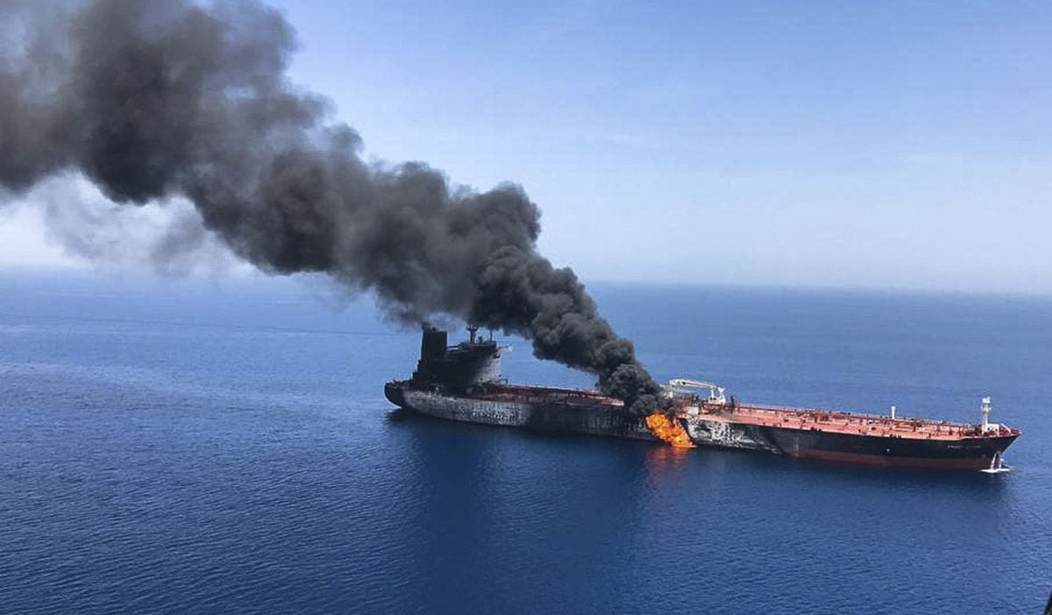Secretary of State Mike Pompeo is accusing Iran of a “blatant assault” on oil tankers in the Gulf of Oman earlier on Thursday. Last month, four tankers were attacked with mines, presumably planted by Iran.
In a news conference Thursday afternoon, Pompeo said: “This assessment is based on intelligence, the weapons used, the level of expertise needed to execute the operation, recent similar Iranian attacks on shipping, and the fact that no proxy group operating in the area has the resources and proficiency to act with such a high degree of sophistication.”
He charged that Iran was working to disrupt the flow of oil through the Strait of Hormuz and this is a deliberate part of a campaign to escalate tension, adding that the U.S. would defend its forces and interests in the region, although he did not elaborate.
His comments came shortly after a senior U.S. defense official told Fox News the U.S. Navy saw an unexploded mine attached to the hull of the Panama-listed, Japanese-owned Kokuka Courageous ship, one of the two ships attacked. It’s the same type of mine used to damage four oil tankers last month in the same area – an attack senior Pentagon officials blamed on Iran.
That assessment is spot on. Iran has the motive, means, and opportunity to attack shipping in the Strait of Hormuz. While other Gulf nations would benefit from rising oil prices, Iran has a history of mining the straits. They also are entirely capable of carrying out an operation of this nature, as they have shown in the past.
Acting Defense Secretary Pat Shanahan praised the Navy’s USS Bainbridge for its actions in assisting one of the damaged tankers.
1 of 4: We applaud the remarkable courage of the crew of the @USNavy’s USS Bainbridge in rescuing merchant mariners from a Panamanian ship on fire following the attack in the Gulf of Oman. Our servicemembers are in harm’s way protecting international norms & freedoms.
— Acting SecDef Pat Shanahan (@ActingSecDef) June 13, 2019
2 of 4: Iran’s continued unprovoked attacks in the region are a threat to international security and peace and an assault against freedom of navigation on the open seas.
— Acting SecDef Pat Shanahan (@ActingSecDef) June 13, 2019
Needless to say, tensions with Iran have escalated as a result of this attack:
Whether it be a torpedo or mines, Jakob P. Larsen, head of maritime security for the international shipping association BIMCO, told the Associated Press that the incident brings the region closer to an armed conflict.
“The shipping industry views this as an escalation of the situation, and we are just about as close to a conflict without there being an actual armed conflict, so the tensions are very high,” he said.
What does Iran hope to accomplish? Some analysts are speculating that Donald Trump’s renewed sanctions against Iran are beginning to bite. Indeed, once enjoying a modest “Obama recovery” after the former president inked the nuclear deal, giving Iran access to hundreds of billions of dollars, the Iranian economy is in the pits. Inflation is beginning to spiral out of control, unemployment among the young is at epidemic proportions, and Iran is denied access to international credit markets. They can’t sell their oil on the open market and are forced to evade the sanctions as best they can.
The Iranian people are restless and tired of the empty promises made by the regime. It’s a very combustible situation.
So what better way to alleviate the pressure than to pick a fight with the Great Satan? The only problem for Iran is that Trump may very well call their bluff and attack.
The region, already a tinderbox with the Saudis and Iran engaged in a proxy war in Yemen, might very well explode in a costly, murderous conflict with an uncertain outcome. That’s why it’s likely that Iran will pull back from the brink and behave themselves.
At least for a little while.










Join the conversation as a VIP Member